
Health Challenges In Ramadan
During this time we mustn't forget about the true meaning of Ramadan Kareem, which is about spiritual reflection, discipline and unity among Muslims across the globe. The event extends from the first day of the Islamic month of Ramadan to the Eid al-Fitr. It requires individuals to fast from dusk until dawn and entails avoidance of food, fluids, tobacco, and other requirements that may be needed throughout the day. As far as the physical aspect of fasting is concerned, it is extremely important to note that while the religious and spiritual gains of Ramadan fasting are inestimable, fasting itself comes with plenty of health complications which, if not monitored, may mar the healthy intentions of fasting.
Dehydration:
A major health issue that affects the fasting month of Ramadan, most especially in countries where the heat is so intense, is dehydration. Since people who are fasting do not consume water before dusk, the danger of dehydration is very high, in part, especially in hot regions. These include dryness of the mouth, skin, lips, and eyes, frequency of urination, feelings of weakness, head achiness, and dizziness. To counter these effects, one needs to take enough water in between the Iftar and Suhoor, which are, respectively, the meals for breaking the fasting and the meals consumed before dawn. Water containing or high in electrolytes should be encouraged to be taken most while taking beverages that have caffeine or sugar as they make you dehydrated should be discouraged. Many people in Pakistan can experience severe diarrhoea. Still, there is a safe and easy remedy such as Oral Rehydration Salts (ORS) like Hydralyte or ordinary water containing a solution of a teaspoon of salt and half a teaspoon of sugar.
Gastrointestinal Problems:
Stomach disorders are other illnesses that are characteristic of people during the fasting month of Ramadan. This inactivity, coupled with clock forwarding when one has been fasting from dawn up to evening time and taking a large meal at Iftar, increases the chances of experiencing indigestion, bloating, and constipation, amongst other complaints. To avoid these problems, it is advised to take moderated amounts of fiber obtained from better sources such as fruits, vegetables and whole grains. Dividing food intake into several portions instead of eating an enormous amount within a few hours at Iftar is also beneficial for digestion and overall adjustment to the fasting regime. If one is suffering from indigestion, he may opt for taking antacids like Gaviscon, or if he wants to digest the food effectively, he may take digestive enzymes like Creon. Also, products such as Ispaghol (psyllium husk) supplement can be efficient in managing this particular problem of constipation.
Headaches and Hypertension:
Ramadan consists of different features that may alter result in headaches and these are, dehydration, caffeine withdrawal, low blood sugar, and sleep disturbances. Regular caffeine users who incorporate caffeine products in their bodies to which their systems are already adjusted suffer from withdrawal effects when they stop using it. Mild withdrawal symptoms associated with caffeine are, therefore, likely to be relieved gradually as one adjusts to the reduction in caffeine intake before Ramadan. It is also important to note that adequate intake of water and sleep are of equal importance in combating these headaches. Home remedies for headaches include the use of pain relief drugs that are available at the local stores without needing a prescription, such as paracetamol, known as Panadol, or Brufen, which is also known as ibuprofen.
Hypoglycemia (Low Blood Sugar)
Another risk factor is low blood oxygen level, commonly known as hypoglycemia, which is a major worry of diabetics or any individual(s) whose body system is sensitive to fluctuating blood sugar levels. By case, low blood sugar signs include dizziness, sweating, shakiness, and confusion that results from low blood sugar levels. Muslims have to make sure they take foods/in rigorous foods with complex carbohydrates, proteins, healthy fats so that they can gain more strength during their days. Ramadan fasting is thus important for all Muslims and those having diabetes should be cautious, especially on their glycaemic control and should consult their doctors on the most appropriate timing for fasting and any alteration that will affect their diabetes regimen during the fasting period in the light of the Islamic calendar. Measures included the administration of drugs such as, Glucophage, which should only be taken based on a doctor's recommendation, and the regular use of glucose tablets during cases of hypoglycemia.
Socio-Psychological Impact
It is imperative to mention the socio-psychological aspects of fasting and/or disease during Ramadan as well. The effects associated with Ramadan fasting concerning mental health can be conditioned both with positive changes and with developments, which can be considered as the paths to complicated conditions. Because Ramadan is a religious practice, feelings of togetherness and serenity can be empowered by the practice and the social act. However, physical activities such as walking, standing for long hours, and food restrictions, along with altered food intake patterns and irregular sleep patterns, can also result in stress and mood changes. Do get enough rest, social interaction with friends and families, or seek support from religious leaders for spiritual and emotional needs while they are also conducting their usual activities during this special month. At times, sympathetic drugs such as Ativan (Lorazepam) or herbal products of natural medication but under prescription.
Conclusion
In conclusion, though Ramadan Kareem is undoubtedly a period of spiritual and togetherness it is important also to mention several health risks that should be conducted well. This way, by drinking water as much as possible, eating right, cutting down on caffeine and being able to tend to both the body and the soul, people will be able to get through this month a whole lot easier while also surviving the fasting period in order to get all the spiritual benefit that the holy month will bring. Thus, proper and effective preparation for Ramadan can be achieved by recommending and using the medications available in Pakistan and, if necessary, consulting a specialist to get a healthy and joyful experience.

